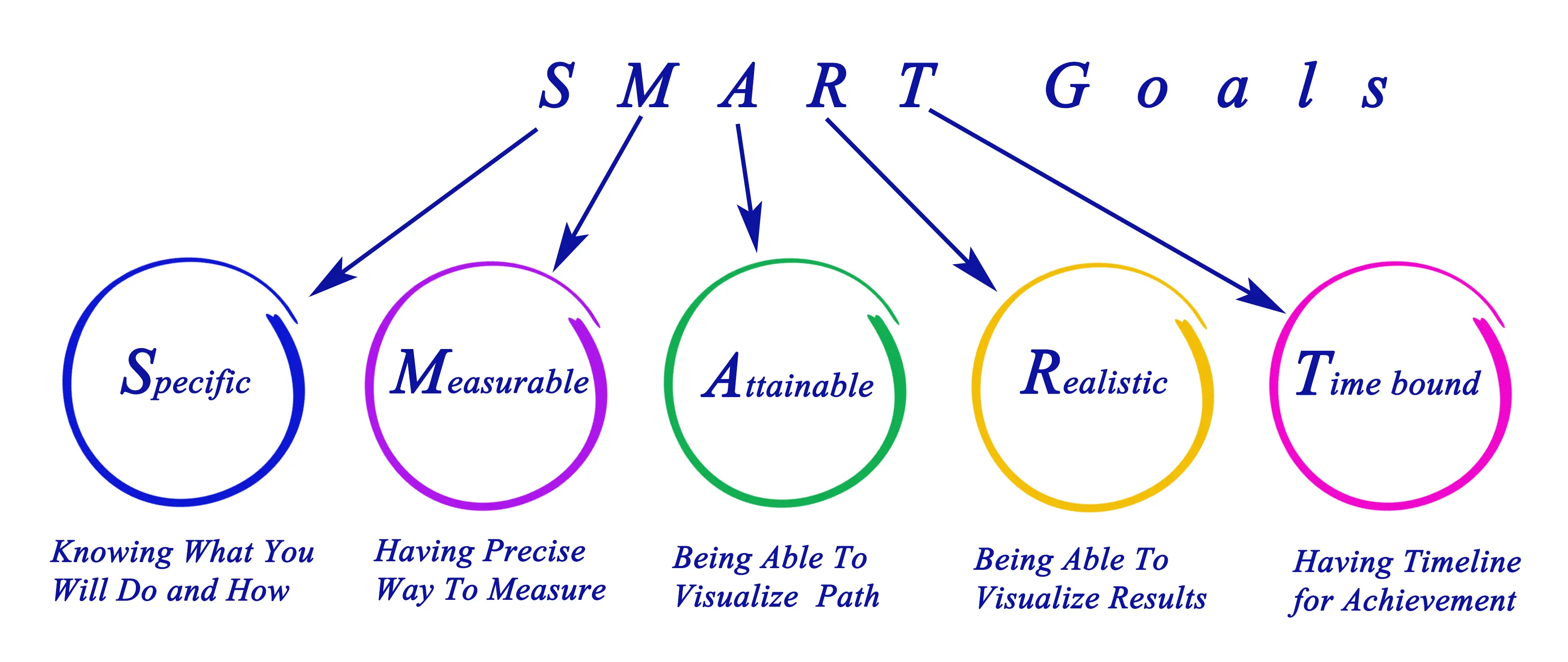As a BetterHelp affiliate, we receive compensation from BetterHelp if you purchase products or services through the links provided
When beginning therapy, it’s essential to establish short-term goals that serve as a starting point for addressing your mental health concerns. These goals provide direction and serve as a means to measure progress throughout the therapeutic process. Setting attainable and realistic objectives allows you to work collaboratively with your therapist to ensure consistent progress.
Understanding the importance of short-term goals in therapy can help you build a strong foundation for your mental health journey. These goals will aid in identifying challenges and implementing strategies to overcome them. You will notice a positive shift in your well-being and relationships as you explore various therapeutic techniques and maintain motivation and self-compassion.
Key Takeaways
- Short-term goals in therapy provide direction and a means to measure progress.
- Establishing clear goals helps in identifying challenges and implementing strategies to overcome them.
- Exploring different therapeutic techniques and maintaining motivation leads to improved mental health and relationships.
 Understanding the Importance of Short-Term Goals in Therapy
Understanding the Importance of Short-Term Goals in Therapy
Short-term goals in therapy play a crucial role in your progress and overall therapeutic experience. These goals are designed to be achievable within a relatively short period, helping you stay focused and motivated as you improve your mental and emotional well-being.
Benefits of setting short-term goals in therapy:
- Measurable progress: Breaking down your long-term therapy goals into smaller, short-term goals allows you to track your progress more easily. This helps you see the positive changes and improvements you’re making, which can motivate and encourage you to keep going.
- Focus and direction: Short-term goals provide a clear path for you and your therapist. With specific objectives in mind, you can work together to create a tailored treatment plan that addresses your needs effectively.
- Flexibility and adaptability: Your needs and priorities may change as you progress in therapy. Short-term goals offer the flexibility to adjust your therapeutic plan and align it with your current situation, allowing for a more personalized and adaptable experience.
Tips for setting short-term therapy goals:
- Stay realistic: Short-term goals should be achievable within a few weeks or months. Make sure to set realistic expectations to avoid becoming discouraged or overwhelmed.
- Prioritize your needs: Identify the most pressing issues you want to address first and set specific, attainable goals around them.
- Make it personal: Your goals should be meaningful to you and tailored to your unique circumstances, desires, and needs.
- Communicate with your therapist: Collaborate on goal-setting to ensure your treatment plan aligns with your objectives and needs.
- Evaluate and adjust: Regularly review your progress, and don’t hesitate to adjust your goals if needed. Change is a natural part of the therapeutic process; staying flexible will help you get the most out of your therapy experience.
Remember, setting short-term goals in therapy is essential for measuring progress, staying focused, and adapting to your evolving needs. You can work towards a more fulfilling and successful therapeutic journey by staying realistic, prioritizing your needs, and communicating openly with your therapist.
 Establishing Clear and Measurable Goals
Establishing Clear and Measurable Goals
Regarding goal setting in therapy, focusing on clear and measurable goals is essential. This means defining specific objectives that can be easily tracked and assessed. As you begin your therapy journey, consider the following strategies for establishing achievable short-term goals:
Identify Your Needs:
Start by reflecting on the areas you want to improve or change in your life. Think about what has led you to therapy and the outcomes you desire. This will help create a foundation for your short-term goals.
 Set SMART Goals:
Set SMART Goals:
Having clear goals in therapy means they should be Specific, Measurable, Achievable, Relevant, and Time-bound. This approach ensures well-defined objectives can be tracked throughout your therapeutic process. As you set your goals, ensure they meet these criteria:
- Specific: Clearly define the goal, what it involves, and why it’s important.
- Measurable: Include some way to measure progress and success, whether through observable actions or changes in thoughts and emotions.
- Achievable: Ensure the goal is realistic and within your capabilities.
- Relevant: Choose goals that relate to your overall therapy objectives and align with your values.
- Time-bound: Set a timeframe for achieving the goal to help maintain focus and motivation.
Break Down Larger Goals:
Sometimes, breaking down larger goals into smaller, more manageable steps can be helpful. Doing this lets you focus on incremental progress and celebrate small accomplishments along the way. As you work on your short-term goals, think about the specific actions you can take to make those goals a reality.
Collaborate with Your Therapist:
Your therapist is there to help you create a plan of action and guide your therapy journey. Involving them in your goal-setting process ensures you’ll have their expertise and support. They can help you clarify your goals and suggest steps to take to achieve them.
Regularly Review and Adjust Goals:
As you progress through therapy, reviewing and adjusting your goals as needed is important. This allows you to recognize growth and adapt your objectives to your current needs and circumstances. Regular goal review also increases accountability and helps you maintain motivation.
Establishing clear and measurable goals can significantly improve your therapeutic experience and set yourself up for success. Remember to stay open to adjustments and work closely with your therapist to ensure your goals align with your needs and personal growth.
Identifying and Overcoming Challenges
When embarking on self-improvement in therapy, it’s essential to recognize the challenges and obstacles that can arise during this process. You might face stress, depression, anxiety, distress, low self-esteem, shame, or other difficulties. To help you succeed in achieving your short-term therapy goals, it’s crucial to identify these challenges and develop strategies to overcome them.
First, take a moment to reflect on your life and identify which obstacles are posing the most significant issues for you. Consider how stressors like work, relationships, and personal beliefs might contribute to your emotional state. This self-awareness will help increase your understanding of the challenges you’re facing.
Next, break down each challenge into manageable steps. For instance, if you’re dealing with anxiety, consider addressing specific triggers, such as social situations or public speaking. By breaking down a big obstacle into smaller tasks, you’ll feel a sense of accomplishment as you take control of your mental health step by step.
As you tackle these challenges, remember to be kind to yourself and practice self-compassion. Your journey of healing won’t be perfect, but every effort you make builds resilience and self-esteem. Recognize your progress and celebrate your accomplishments, no matter how small.
If you’re struggling with a specific issue, such as smoking, take active steps to address it. Empower yourself with knowledge about the negative effects of smoking and find support from friends and family, or join a support group if it suits your needs. Combining knowledge and support will create a firm foundation to help you overcome this challenge.
Finally, don’t hesitate to contact professionals who can assist you. A trained therapist can guide, help build healthy coping mechanisms, and recommend resources tailored to your situation. Remember, it’s okay to ask for help. With the right support and strategies, you’ll be well-equipped to overcome the challenges that may arise as you work towards your short-term therapy goals.

Exploring Different Therapeutic Techniques
Various therapeutic techniques are available to address short-term goals in counseling and psychotherapy. As you seek treatment, it’s essential to understand therapists’ different approaches to help you make an informed decision.
Cognitive Behavioral Therapy (CBT) is one of the most common techniques utilized in therapy. CBT focuses on changing negative thought patterns and behaviors to help improve your overall well-being. This therapeutic approach can effectively address short-term goals, such as coping with stress, overcoming anxiety or improving communication skills.
Solution-Focused Brief Therapy (SFBT) is another technique that works well for short-term therapy goals. In SFBT, you and your therapist collaborate to envision a future without the issue you’re dealing with, identify your strengths, and establish clear, achievable goals. Together, you’ll work on building solutions and making progress toward your desired outcome.
Counseling interventions play a significant role in achieving short-term goals in therapy. Therapists utilizing various interventions can help facilitate behavioral change, improve relationship-building skills, enhance coping abilities, and guide decision-making processes. Some common interventions include:
- Active listening: Providing space for you to express your thoughts and feelings without judgment, fostering understanding and empathy from your therapist.
- Goal clarification: Helping you develop achievable goals and establishing a roadmap to reach them.
- Problem-solving strategies: Collaborating with you to identify solutions by examining alternative perspectives and potential outcomes.
When exploring different therapeutic techniques, choosing the one that best aligns with your needs and short-term goals is important. A key takeaway is maintaining open communication with your therapist, ensuring the chosen approach resonates with you.
Implementing Strategies for Continued Progress
Developing effective short-term goals in therapy relies on creating a solid action plan and utilizing your strengths. Here are some strategies to help you stay on track and make progress in your therapy journey:
- Identify your actions and thoughts: To make lasting changes, start by recognizing patterns that contribute to your challenges. Be mindful of your thoughts, emotions, and actions, and consider how they might influence your well-being.
- Leverage your strengths: Focus on what you do well and use those strengths to your advantage. This can help to boost your self-confidence and make you more likely to succeed.
- Develop coping skills: Building resilience will enable you to handle stressors and setbacks more effectively. Work with your therapist to identify appropriate coping skills matching your circumstances.
- Create an action plan: Break down your goals into manageable tasks and assign dates for completion. Use a goal-planning worksheet or workbook to track your progress and adjust as needed.
- Seek support: Share your goals and action plans with friends, family, or support groups to receive encouragement and accountability. This can help you stay motivated and focused on your progress.
Remember that the key to success in therapy is to remain dedicated and persistent. By following these strategies, you will be on your way to achieving your short-term goals and building a foundation for long-term growth.
 Maintaining Motivation and Self-Compassion
Maintaining Motivation and Self-Compassion
Keeping motivation and self-compassion in mind is essential when working on short-term goals in therapy. Motivation plays a key role in making progress, while self-compassion is a reminder that setbacks and challenges are a natural part of the process.
To maintain motivation during therapy, consider these strategies:
- Break down larger goals into smaller steps. This makes them more manageable and helps you track your progress better.
- Stay connected to your reasons for seeking therapy, and remind yourself of the positive changes you hope to achieve.
- Celebrate your achievements, no matter how small. Recognizing progress can help reinforce your commitment to change and boost your motivation.
- Stay flexible and adjust your goals as necessary, taking into account your current circumstances and needs.
Self-compassion goes hand in hand with motivation. It’s crucial to remember that growth often involves setbacks, and it’s important to be kind to yourself during challenging moments. Here are a few tips on how to practice self-compassion in therapy:
- Treat yourself with the same understanding and kindness you would offer a friend facing similar struggles.
- Acknowledge your emotions and allow yourself to feel them fully. Feeling frustration, sadness, or anxiety is okay – these emotions are a normal part of the therapeutic process.
- Remember that everyone experiences setbacks, and they don’t define your worth or ability to succeed.
- Engage in self-compassionate activities like journaling, meditation, or speaking with a supportive friend.
Key Takeaway: To maintain motivation and self-compassion in therapy, break larger goals into smaller steps, stay connected to your reasons for seeking therapy, celebrate your achievements, and practice kindness toward yourself during challenging moments.
The Connection Between Therapy Goals and Relationships
Building a strong and healthy relationship is vital in attaining happiness, but sometimes, even the most well-meaning couples need assistance. Therapy goals focused on improving relationships can provide a pathway to better communication and emotional intimacy.
Through therapy, you can develop various skills that will enable you to improve your relationships. Here are some key aspects to consider when setting therapy goals related to relationships:
- Effective Communication: Understanding and expressing your partner’s needs is essential to a healthy relationship. Therapy can guide you on refining your communication skills, which can lead to a better connection.
- Conflict Resolution: Disagreements are inevitable in every relationship. Learning various techniques and strategies to resolve and manage conflicts calmly is integral to relationship-focused therapy goals.
- Emotional Intimacy: Emotional intimacy fosters trust and understanding between partners. Therapy can help you explore ways to open up emotionally, making it easier for you and your partner to connect on a deeper level.
- Empathy and Understanding: Putting yourself in your partner’s shoes and developing empathy can enhance your relationship. This skill can strengthen your bond by reducing misunderstandings and increasing support for one another.
Consider these strategies when setting your therapy goals, and remember that these goals should be realistic and achievable. Flexibility and patience are important as you work towards improved relationships. Don’t forget to celebrate your progress, even if it’s just a small step towards a more fulfilling partnership.
 Long-Term Goals Vs. Short-Term Goals
Long-Term Goals Vs. Short-Term Goals
Setting both long-term and short-term goals is essential for a successful outcome in therapy. Understanding the differences between these two types of goals and how they’re interconnected is important. Let’s take a closer look.
Long-term goals are your ultimate desired outcomes, which may take months or even years. They’re often broad and complex, encompassing the overall improvements you’d like to see. Examples of long-term therapy goals might include overcoming a long-standing fear, improving overall mental health, or developing positive coping strategies for dealing with stress.
Short-term goals, on the other hand, are smaller, more tangible objectives that can be accomplished within a few weeks or months. They’re essentially stepping stones on the path to achieving your long-term goals. By breaking down your larger aspirations into more manageable pieces, you can make consistent, measurable progress in therapy. Examples of short-term goals include practicing specific relaxation techniques, identifying triggers for anxiety, and working on communication skills with your therapist.
When setting therapy goals, be sure to keep them realistic. Setting unattainable expectations can lead to frustration and disappointment, hindering your progress. To ensure your goals are achievable, consider the following tips:
- Clearly define both short-term and long-term goals.
- Ensure they’re realistic, given your current situation and the time frame you’re working with.
- Regularly reassess your progress and adjust your goals as needed.
In summary, a balanced approach to goal setting in therapy involves establishing both long-term and short-term goals that are realistic and achievable. By working towards these smaller objectives, you’ll gradually build the skills, confidence, and resilience to conquer your more ambitious, long-term aspirations.
Assessing Progress and Adapting Goals
During your therapy journey, assessing your progress with short-term goals is crucial. Assessing your success and making necessary adjustments to your goals can lead to a more effective therapy experience. Here are some tips to help you succeed:
- Regular assessments: Make it a habit to evaluate your progress regularly, such as every few weeks. This will allow you to identify areas where you excel and areas that may need more attention.
- Use worksheets: Worksheets can be valuable assessment tools that help you track milestones and organize your thoughts. Many therapists offer goal-setting worksheets to help monitor your progress and make changes as needed.
- Celebrate your achievements: Acknowledge your milestones and celebrate your accomplishments, no matter how small. This can boost your motivation and help you recognize your progress.
- Be adaptable: Your short-term goals may need to be altered based on your outcomes, and that’s okay. Be open to modifying your goals as you gain new insights or face unexpected challenges.
- Communicate with your therapist: Maintain an open dialogue about your progress, setbacks, and adjustments you may need to make to your goals. They can offer valuable guidance and support.
Remember, tracking your progress and adapting your goals is essential to therapy. By staying proactive and open to change, you can maximize the benefits of your therapy sessions and move closer to achieving your long-term goals.
Concluding Thoughts
Setting short-term goals is vital to your personal growth and development as you progress in your therapy journey. These goals provide a clear roadmap, helping you recognize where you want to be and how to get there.
You can start by breaking down your broader motives into smaller, manageable objectives. For example, to improve your relationships, make it a short-term goal to have open, honest conversations with friends and family or actively seek social support. It’s essential not to overwhelm yourself with too many goals; instead, focus on key areas to promote steady progress.
You can take advantage of different strategies in your therapy sessions. For instance, practicing positive affirmations, identifying emotions, and building healthy habits are all useful tools in shaping your desired outcome. Remember that therapy is a team effort: view your therapist as an ally and work together to develop a personalized plan to reach your goals.
Moreover, taking stock of your accomplishments and tracking your progress might be helpful. Celebrate small victories along the way, as each step adds up to your overall development. Don’t forget to adjust your goals as needed and allow room for growth and change.
In social work, short-term goals can bridge the gap between your current situation and your desired outcome. These objectives may involve developing coping mechanisms or engaging with social resources to address specific challenges.
As you wrap up this article, remember that setting short-term goals is ongoing. It requires reflection, adaptation, and perseverance. Embrace the journey and take pride in your achievements as you work towards lasting positive change.
Frequently Asked Questions

What are common examples of short-term therapy goals?
Short-term therapy goals can vary depending on the individual’s needs, but here are some common examples:
- Identifying and managing triggers for anxiety or stress.
- Improving communication skills within relationships.
- Enhancing coping mechanisms for dealing with difficult emotions.
- Developing healthier self-esteem and self-image.
- Cultivating self-compassion and self-care habits.
How can I set effective short-term goals for mental health therapy?
To set effective short-term goals, consider the following steps:
- Identify your specific areas of concern or challenges.
- Break down larger goals into smaller, manageable steps.
- Set realistic and achievable targets with clear timelines.
- Write down your goals and review them regularly.
- Seek support from a mental health professional, like a therapist or counselor.
What is the role of short-term goals in addressing anxiety?
Short-term goals can play a crucial role in addressing anxiety by:
- Providing a clear focus and direction for therapy sessions.
- Encouraging the development of coping skills and strategies for managing anxiety.
- Offering a sense of accomplishment and progress as improvements are made.
- Reducing feelings of being overwhelmed by breaking larger goals into manageable steps.
Which strategies can help achieve short-term goals in counseling?
Several strategies can help individuals achieve short-term goals in counseling, including:
- Collaborating with a therapist to develop an action plan.
- Regularly reviewing and adjusting goals based on progress and personal growth.
- Using coping techniques, such as mindfulness or journaling, to help manage emotions.
- Seeking support from friends or family members to stay accountable.
How do short-term therapy goals relate to long-term objectives?
Short-term therapy goals serve as the foundation for reaching long-term objectives by:
- Breaking down larger aspirations into achievable steps.
- Providing a sense of progress and motivation along the journey.
- Allowing for adjustments and adaptations based on individual growth.
- Creating a roadmap toward overall mental health and well-being.
What are some useful resources for setting and tracking short-term therapy goals?
You may find the following resources helpful for setting and tracking short-term therapy goals:
- Goal-setting worksheets and templates designed for counseling or therapy, like those from Therapist Aid.
- Cognitive behavioral therapy (CBT) workbooks or self-help manuals.
- Mobile apps or websites are dedicated to tracking progress and maintaining accountability.
- Local support groups or online forums where others share their experience and advice.
About Jacob Maslow
After surviving the traumatizing events of 9/11, I took it upon myself to heal through helping others. I’m the primary caregiver of my children and understand from first-hand experience the lonely paths you have to walk as a partner and parent when leaving an unhealthy relationship.
We’re all echoing in a dark space that doesn’t have to be this empty, and that’s been my mission since finding solace and recovery in therapy: To help comfort others who are still in shock and at the prime of their struggle.
I came across BetterHelp after searching for this type of community. I wanted to belong to a body of proactive therapists and supportive therapy veterans that allowed me to see other sides of the story.
It was unconventional, and that’s what attracted me most. During my most challenging times, when my ex-wife completely cut me off from my children, I found comfort and clarity through BetterHelp.
Instead of being chained to a strict therapist recommendation, I was in charge of who I felt understood my struggle most. That allowed me to find my true peace, as I was reunited with those who read behind my words and had first-hand experience with my trauma.
Recovery is a choice; with BetterHelp, that choice will be a few clicks away. You can join their couples-oriented platform, Regain.us, for those stuck with family estrangement and toxic relationship patterns.
- Breaking the Silence: Why Men’s Mental Health Matters More Than Ever - April 15, 2025
- How to Transform a Home’s Patio Space into a Relaxing Space - March 23, 2025
- 5 Strategies to Use a Cell Phone to Help Manage Your Stress - March 23, 2025
This site contains affiliate links to products. We will receive a commission for purchases made through these links.


 Understanding the Importance of Short-Term Goals in Therapy
Understanding the Importance of Short-Term Goals in Therapy Establishing Clear and Measurable Goals
Establishing Clear and Measurable Goals Maintaining Motivation and Self-Compassion
Maintaining Motivation and Self-Compassion Long-Term Goals Vs. Short-Term Goals
Long-Term Goals Vs. Short-Term Goals
